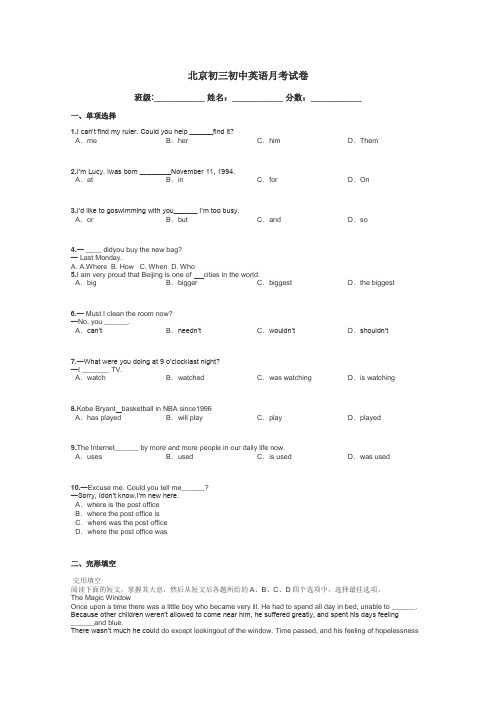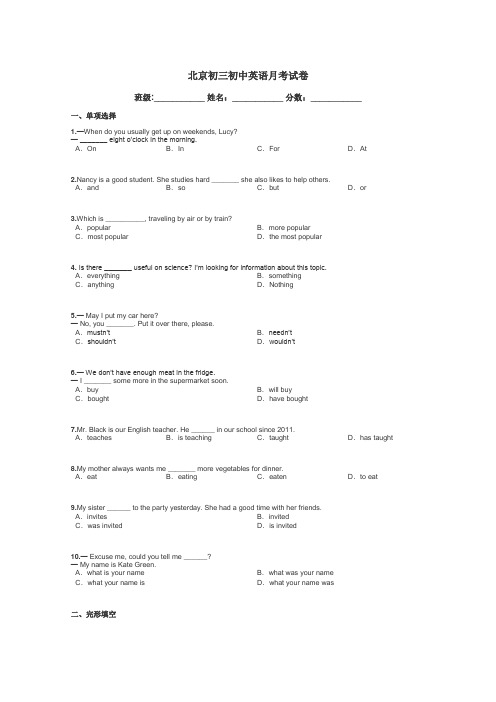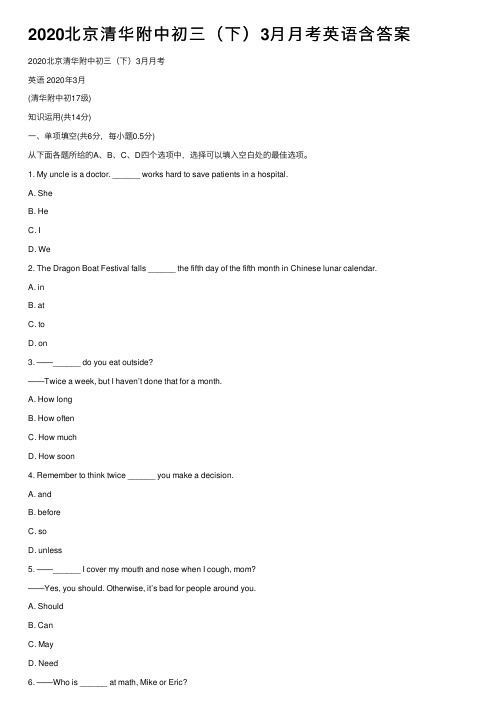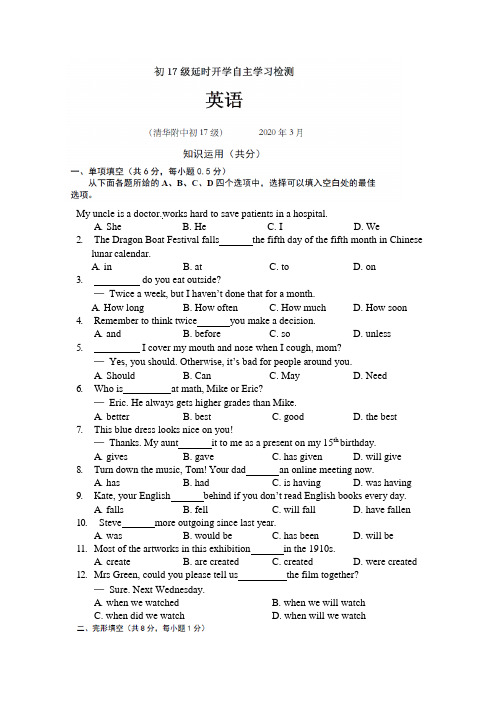2020学年北京市清华附中初三下学期三月月考英语试题及答案
北京初三初中英语月考试卷带答案解析

北京初三初中英语月考试卷班级:___________ 姓名:___________ 分数:___________一、单项选择1.I can’t find my ruler. Could you help ______find it?A.me B.her C.him D.Them2.I’m Lucy. Iwas born ________November 11, 1994.A.at B.in C.for D.On3.I’d like to goswimming with you______ I’m too busy.A.or B.but C.and D.so4.— ____ didyou buy the new bag?— Last Monday.A. A.WhereB. HowC. WhenD. Who5.I am very proud that Beijing is one of cities in the world.A.big B.bigger C.biggest D.the biggest 6.— Must I clean the room now?—No, you ______.A.can’t B.needn’t C.wouldn’t D.shouldn’t 7.—What were you doing at 9 o’clocklast night?—I _______ TV.A.watch B.watched C.was watching D.is watching8.Kobe Bryant basketball in NBA since1996A.has played B.will play C.play D.played9.The Internet______ by more and more people in our daily life now.A.uses B.used C.is used D.was used 10.—Excuse me. Could you tell me______?—Sorry, Idon’t know.I’m new here.A.where is the post officeB.where the post office isC.where was the post officeD.where the post office was二、完形填空完形填空阅读下面的短文,掌握其大意,然后从短文后各题所给的A、B、C、D四个选项中,选择最佳选项。
人教版2019-2020学年九年级下学期3月月考英语试卷(I)卷

人教版2019-2020学年九年级下学期3月月考英语试卷(I)卷一、单项选择 (共15题;共30分)1. (2分)—Do you often play _____volleyball after school, Mary?—Yes, I do. Don't you know I am _____good volleyball player?A . a; aB . a; /C . the; aD . /; a2. (2分)Tom's cat is white, but is gray.A . myB . herC . mineD . your3. (2分)I predict there will be less ______ in the future.A . peopleB . treesC . countriesD . pollution4. (2分)Nowadays _______ like to work at home, _______ like to go abroad.A . one, the otherB . some, othersC . some, the others5. (2分)【2015贵州六盘水】23.You are supposed to type quickly when talking with others on QQ.A . mustB . canC . shouldD . would6. (2分)—How happy the grandparents are! —Yes, they for fifty years.A . have been marriedC . How got marriedD . married7. (2分)When there's snow, it isn't cold.A . too much; much tooB . much too; too muchC . too much; too much8. (2分)—China is a great country with 5,000 years ___________history.—Yes, it's three years ________I went to China last time. I want to go there again.A . in, sinceB . of, sinceC . of, until9. (2分)Listen! Bob________ an English song in the room.A . singsB . singC . is singingD . singing10. (2分)It's ten o' clock in the evening. Who is in the classroom?A . evenB . onlyC . stillD . never11. (2分)My brother is too to to school alone.A . young;goB . younger;goC . young;goingD . younger;going12. (2分)The train _____ because of an accident; many passengers are now waiting anxiously at the railway station.B . delayedC . has delayedD . had been delayed13. (2分)—Excuse me, sir. Is this library open all day?—________. Only from 9:00 a.m. to 4:00 p. m. on weekends.A . That's right.B . Yes, of course.C . Sorry, I'm not sure.D . Sorry, I`m afraid not.14. (2分)—Could you please tell me ?—Two days ago.A . when did you go for a picnicB . when you went for a picnicC . when will you go for a picnicD . when you will go for a picnic15. (2分)—?— Yes, I'd like some milk.A . Where are youB . What do you doC . Can I help youD . How can you get the milk二、完形填空 (共1题;共10分)16. (10分)根据短文理解,从A、B、C、D四个选项中选择最佳答案填空。
北京初三初中英语月考试卷带答案解析

北京初三初中英语月考试卷班级:___________ 姓名:___________ 分数:___________一、单项选择1.—When do you usually get up on weekends, Lucy?—_______ eight o’clock in the morning.A.On B.In C.For D.At2.Nancy is a good student. She studies hard _______ she also likes to help others.A.and B.so C.but D.or3.Which is __________, traveling by air or by train?A.popular B.more popularC.most popular D.the most popular4.Is there _______ useful on science? I’m looking for information about this topic.A.everything B.somethingC.anything D.Nothing5.— May I put my car here?— No, you _______. Put it over there, please.A.mustn’t B.needn’tC.shouldn’t D.wouldn’t6.—We don’t have enough meat in the fridge.— I _______ some more in the supermarket soon.A.buy B.will buyC.bought D.have bought7.Mr. Black is our English teacher. He ______ in our school since 2011.A.teaches B.is teaching C.taught D.has taught 8.My mother always wants me _______ more vegetables for dinner.A.eat B.eating C.eaten D.to eat9.My sister ______ to the party yesterday. She had a good time with her friends.A.invites B.invitedC.was invited D.is invited10.— Excuse me, could you tell me ______?— My name is Kate Green.A.what is your name B.what was your nameC.what your name is D.what your name was二、完形填空During summer vacations, I would volunteer at the pet rescue (救助) centre, so I could see a lot of dogs. Minnie was the funniest-looking dog I'd ever seen by far. Her body looked like a sausage. Her hair was too thinto her body. Her eyes always seemed surprised, and her tail was so short that it looked like a rat’s tail.She looked so strange that her didn’t want her any more. She was brought to the centre. But I thought, “Minnie was kind and sweet. No one should laugh at her strange looking.” So I gave Minnie a good bathand her in the newspaper: “Funny-looking dog, kind and sweet, needs loving .”Later, a boy called me, but I warned him that Minnie was . However, the boy told me that his grandf ather’s sixteen-year-old dog had just died. They wanted to keep Minnie very much. Hearing these words, I said that they could take Minnie away. I combed (梳) her hair, and gave her a good bath. Then we waited for them to arrive.At last, an old car stopped in front of the pet rescue centre. Two kids to the door. They put Minnie into their arms and rushed out to their grandfather, who was waiting in the car. I hurried behind them to see his reaction (反应).Inside the car, the grandfather put Minnie in his arms and her soft hair. She looked very relaxed and happy. “She’s perfect, and I like her!” the old man said. I was that Minnie had found a good owner. Just at that time, I saw that the grandfather’s eyes were a milky white color—he was blind.After that summer vacation, I missed Minnie so much. So I went back to the grandfather’s house. The grandfather was walking in the garden with Minnie the way. I could see both of them were happy. “Minnie is the most beautiful dog in my eyes,” said the grandfather, “I’ve felt happier before!” Hearing this, I was pretty happy!【1】A.hide B.warm C.protect D.cover【2】A.owner B.leader C.teacher D.partner【3】A.introduced B.reported C.praised D.advertised【4】A.school B.family C.hospital D.zoo【5】A.sick B.dirty C.ugly D.dangerous【6】A.jumped B.stepped C.walked D.raced【7】A.tidied B.cleaned C.touched D.pulled【8】A.peaceful B.thankful C.careful D.powerful【9】A.leading B.taking C.giving D.making【10】A.just B.ever C.never D.still三、阅读理解1. A【1】What does the first advertisement ask us to do?A.To send in some jokes.B.To share our pets.C.To talk about kindness.D.To tell a true story.【2】Which of the four advertisements offers the most money?A.Jokes.B.Smart Animals.C.Kindness of Strangers.D.My Story.【3】How can we send our writing in?A.By phone.B.By post.C.By email.D.By going there.2.Spam (垃圾邮件) mail is a fact of Internet life. Some of it carries bad things, but the main problem with spam is that it is unpleasant because it fills your mail box with pointless messages.Most email programs have built-in filters (过滤器) that will discover unwanted messages and put them into a junk folder (垃圾文件夹). You can make the filter learn what you consider to be spam or block certain senders.Avoid letting your email address appear on websites—spammers search the Internet for email addresses. Be careful who you give your email address to, and if you need to send out several copies of an email, use blind copy instead to cover the other people’s addresses.Delete (删除) spam emails without opening them. Signs of possible spam are bad spelling in email headers, strange sender addresses, or emails sent at unusual hours. If you do open a spam mail, never reply to it or clickon any pictures it may have.If you receive an unexpected email pretending (伪装) to come from your bank, credit card company or other supplie rs, be very careful. If the email asks you to reply, don’t do it! Instead, call up these places or visit their websites.Consider setting up a second email address and keep one address for your personal use and another for your online communication.【1】What is the main problem with spam?A.It’s everywhere.B.It carries bad things.C.It’s unpleasant.D.It fills one’s mail box.【2】How many suggestions are there in the passage?A.Three.B.Four.C.Five.D.Six.【3】What should you do if you receive a spam email?A.Reply to it quickly.B.Delete it at once.C.Click its pictures.D.Visit its website.【4】Which of the following is the writer’s idea about spam emails?A.Be careful with them.B.Don’t be afraid of them.C.Find interest in them.D.Try to fight against them.3.Where did that number come from?Eleven and TwelveThe reason behind the change in number naming is that eleven comes from the German term ainlif, which translates to “one left”. Twelve follo ws the same rule. It comes from twalif—“two left”. Why teen is used instead of lif for 13 through 19? There is something sadly lost in history.911 for US Emergency (急救) CallsEarly phones didn’t use phone numbers—the operator had to connect your call by hand—and this led to the need for an emergency code (信号). But later phone numbers became popular, that changed. In 1967, 911 was chosen as the nationwide emergency call because it was easy to remember and could be quickly dialed (拨) on the phone.26.2 Miles in a Marathon (马拉松)The story began with an ancient Greek soldier carrying message from a battlefield (战场) in Marathon to Athens. The modern marathon was born as a flagship event in the first Olympic Games, in 1896, with a distance (距离) of about 25 miles (40 km), as long as the distance from Marathon to Athens. But race organizers for the 1908 Olympic Games in London wanted to add something special. The race began at Windsor Castle and ended at White City Stadium, with runners finishing only after passing the royal (皇室的) box. The distance was 26.2 miles (42.1 km). And since 1924 this distance has been kept in marathon.28 Days in FebruaryBefore using the Gregorian calendar that we use today, one of the first Roman calendars had only 304 days and ten months (March through December), with six months of 30 days and four of 31 days. The second king of Rome improved the old calendar. He added 50 days for January and February. To make the new months longer, he took one day from each of the 30-day months, making 56 days to divide between January and February (or 28 days each). Later January was given one more day to add up to 355 days a year, but February still had 28 days. That’s how it became the shortest month and it stayed that way ever since.【1】Which language do eleven and twelve come from?A.English.B.German.C.French.D.Russian.【2】When was the number 911 chosen for US emergency calls?A.In 1896.B.In 1908.C.In 1924.D.In 1967.【3】 The marathon distance was made longer at London Olympic Games because ______.A.the British was a little weak in mathsB.the British didn’t like the Greek storyC.the British loved the royal family very muchD.the British wanted to make the race different【4】 How many days were there in each month after the king improved the old calendar?A.28, 29 or 31.B.28, 30 or 31.C.28, 29 or 30.D.29, 30 or 31.4.“The world has never been a better place to live in” says science writer Matt Ridley, “and it will keep on getting better.” Read on to see how Ridley makes his case. Right or wrong? You decide.Compared with 50 years ago, when I was just four years old, people now make nearly three times as much money, eat one third more food and expect to live one third longer. In fact, it’s hard to find any areas of the world that’s worse off now than it was then, even though the world population has more than doubled over that period. One reason we are richer, healthier, taller, cleverer, longer-lived and freer than ever before is that the four most basic human needs—food, clothing, fuel and shelter—have grown much cheaper. Take one example: In 1800, a candle providing one hour’s light cost six hours’ work. In the 1880s, the same light from a lamp took 15 minutes’ work to pay for. In 1950, it was eight seconds. Today, it’s half a second. In these terms, we are 43,200 times better off than in1800.In the United States, rivers, lakes, seas and air are getting cleaner all the time. A car today produces less pollution traveling at full speed than a parked car did from leaks (泄漏) in 1970.Although the world population is growing, the rate (率) of increase has been falling for 50 years. Across the world, national birth rates are lower now than in 1960, and in the less developed world, the birth rate has almost halved. According to a research report from the United Nations, population will start falling once it reaches 9.2 billion in 2075. After all, there are already seven billion people on earth, and they are eating better and better.In 1970s, there were 550 billion barrels (桶) of oil reserves (储存) in the world, and in the 20 years that followed the world used up 600 billion. So by 1990, reserves should have been overused by 50 billion barrels. Instead, itis reported there are 900 billion today. They will last for many years and people will find something in place of oil long before they run out.The more we develop, the more we can develop. The more we invent, the more inventions become possible. For 200 years, pessimists (people who believe that terrible things will happen in future) have had all the headlines—even though optimists have far more often been right. There are some reasons for pessimists. No charity (慈善机构) ever raised money by saying things are getting better. No journalist ever got the front page writing a story about how terrible things won’t happen. Don’t be a pessimist—dare to be an optimist!【1】Today, providing one hour’s light costs ______.A.6 hours’ work B.15 minutes’ workC.8 seconds’ work D.0.5 second’s work【2】Which of the following is true, according to the passage?A.Things we used to need were much cheaper than they are today.B.The pollution today is much more serious than it was long ago.C.Population problem has nearly made the world stop developing.D.It’s not necessary to be worried about oil reserves in the world.【3】What does the word “optimists” in the last paragraph mean?A.People who are brave enough to face anything terrible.B.People who can always tell good things from bad ones.C.People who have hopeful and happy feelings about life.D.People who don’t easily believe what they’re told about.【4】 Which of the following can be the best title for the passage?A.Never Give Up B.Cheer UpC.Don’t Be Sad D.Think Out四、其他1.Kevin Pearce, snowboard athlete (运动员), has come a long way since his accident on December 31,2009. 【1】 ,when he fell and hurt his head. Luckily, he was wearing a helmet (头盔).【2】. He stayed in hospital for four months. He still can’t remember several weeks of his life after the accident. Today, Pearce is still working hard to get his health back to 100%.【3】. A year ago, he couldn’t walk straight. Now, he can not only walk, but he can also drive again.Pearce says he must thank his fans, his friends and especially his family. His parents and elder brothers have been by his side since the accident.【4】. He said he couldn’t have got well so quickly without them.These days, Pearce is back on the snowboarding circuit (巡回比赛).【5】 . He is on the road again and it is a new beginning for him.2.Why is Denmark the “kingdom of fairy tales”? Because it was the home of famous writer Hans Christian Andersen. But there might be other reasons, says a new study.Denmark is the happiest country in the world, according to the 2013 World Happiness Report by the United Nations (UN). The report ranks(排列)156 countries and regions (地区). All the top five happiest countries are from Europe, and three of them are from Scandinavia.What makes people there happy? The UN considered several reasons.Money is one. We are happy if we have money to cover our necessities. But extra (额外的) money cannot bring us more happiness. People in Northern Europe know this. From cars to mobile phones, from clothes to buildings, their designs are quite simple. Luxury (奢华) is not there.Another reason is health. Nordic (北欧的) people have a healthy diet. They love fresh food. “There is not a big fast-food culture and no ready meals. We sit down with our families to eat our meals,” said Trina Hahnemann, a Danish cook.A harmonious (和谐的) social life also makes us happy, according to the UN report. How about Nordic people? They live in harmony not only with people around, but also with nature. Night life is not popular in Scandinavia. People go home after work for some quality(高品质的) time with family members. Many families have a backyard. Father and child spend hours there each week, planting flowers and building swings.Do you want to be happy? Think about the Nordic lifestyle, and happiness is in your own hands.【1】Where does Hans Christian Andersen come from?【2】How many countries of the top five happiest countries are from Scandinavia?【3】Do Nordic people love fresh food or ready meals?【4】What can make people happy according to the passage?【5】What does the writer want to tell us?五、书面表达文段表达 (15分)根据中文和英文提示,写一封意思连贯、符合逻辑、不少于50词的回信。
2020北京清华附中初三(下)3月月考英语含答案

2020北京清华附中初三(下)3⽉⽉考英语含答案2020北京清华附中初三(下)3⽉⽉考英语 2020年3⽉(清华附中初17级)知识运⽤(共14分)⼀、单项填空(共6分,每⼩题0.5分)从下⾯各题所给的A、B、C、D四个选项中,选择可以填⼊空⽩处的最佳选项。
1. My uncle is a doctor. ______ works hard to save patients in a hospital.A. SheB. HeC. ID. We2. The Dragon Boat Festival falls ______ the fifth day of the fifth month in Chinese lunar calendar.A. inB. atC. toD. on3. ——______ do you eat outside?——Twice a week, but I haven’t done that for a month.A. How longB. How oftenC. How muchD. How soon4. Remember to think twice ______ you make a decision.A. andB. beforeC. soD. unless5. ——______ I cover my mouth and nose when I cough, mom?——Yes, you should. Otherwise, it’s bad for people around you.A. ShouldB. CanC. MayD. Need6. ——Who is ______ at math, Mike or Eric?——Eric. He always gets higher grades than Mike.A. betterB. bestC. goodD. the best7. ——This blue dress looks nice on you!——Thanks. My aunt ______ it to me as a present on my 15th birthday.A. givesB. gaveC. has givenD. will give8. Turn down the music, Tom! Your dad ______ an online meeting now.A. hasB. hadC. is havingD. was having9. Kate, your English ______ behind if you don’t read English books every day.A. fallsB. fellC. will fallD. have fallen10. Steve ______ more outgoing since last year.A. wasB. would beC. has beenD. will be11. Most of the artworks in this exhibition ______ in the 1910s.A. createB. are createdC. createdD. were created12. ——Mrs Green, could you please tell us ______ the film together?——Sure. Next Wednesday.A. when we watchedB. when we will watchC. when did we watchD. when will we watch⼆、完形填空(共8分,每⼩题1分)阅读下⾯的短⽂,掌握其⼤意,然后从短⽂后各题所给的A、B、C、D四个选项中,选择最佳选项。
2020.3清华附中初三自主学习检测试题及答案

初 17 级延时开学自主学7检测英语(清华附中初17 级)2020 年 3 月知识运用(8分).、单项填空(8 6 分,每小题 .5 分)40面各题所给的A、B、C、D 四1选项2,选择可5填入空白处的最6 选项。
1.My uncle is a doctor. works hard to save patients in a hospital.A. SheB. HeC. ID. We2.The Dragon Boat Festival falls the fifth day of the fifth month in Chineselunar calendar.A. inB. atC. toD. on3.—do you eat outside?—Twice a week, but I haven’t done that for a month.A. How longB. How oftenC. How muchD. How soon4.Remember to think twice you make a decision.A. andB. beforeC. soD. unless5.—I cover my mouth and nose when I cough, mom?—Yes, you should. Otherwise, it’s bad for people around you.A. ShouldB. CanC. MayD. Need6.—Who is at math, Mike or Eric?—Eric. He always gets higher grades than Mike.A. betterB. bestC. goodD. the best7.—This blue dress looks nice on you!—Thanks. My aunt it to me as a present on my 15th birthday.A. givesB. gaveC. has givenD. will give8.Turn down the music, Tom! Your dad an online meeting now.A. hasB. hadC. is havingD. was having9.Kate, your English behind if you don’t read English books every day.A. fallsB. fellC. will fallD. have fallen10.Steve more outgoing since last year.A. wasB. would beC. has beenD. will be11.Most of the artworks in this exhibition in the 1910s.A. createB. are createdC. createdD. were created12.—Mrs Green, could you please tell us the film together?—Sure. Next Wednesday.A. when we watchedB. when we will watchC. when did we watchD. when will we watch3、完形填空(8 8 分,每小题 1 分)阅读0面的短文,掌握其大意,然后4短文后各题所给的A、B、C、D 四1选项2,选择最6选项。
2020九年级下学期(三月)质量检测英语月考试卷含答案

2020九年级下学期(三⽉)质量检测英语⽉考试卷含答案2020届市九年级三⽉质量检测试卷英语考⽣注意:本卷共6⼤题、76⼩题,全卷满分120分,考试时间100分钟。
⼀、听⼒理解(20⼩题,每⼩题1分,共20分)第⼀节听下⾯5段对话。
每段对话后有⼀个⼩题,从题中所给的A、B、C三个选项中选出最佳答案,并将其标号填⼊题⽬前括号内。
每段对话读两遍。
1. What's Mike's hobby?A. Singing.B. Reading.C. Drawing.2. How was the boy's weekend?A. It was great.B. It was exciting.C. It was bad.3. Who helped the girl with her math homework?A. Her cousin.B. Her dad.C. Her teacher.4. Where is the woman’s hat?A. It's on her head.B. It's under her bed.C. It's in her bag.5. When was the first showing of the movie?A. On New Year's Day.B. On Chinese New Year's Day.C. On the Lantern Festival.第⼆节听下⾯⼏段对话或独⽩。
每段对话或独⽩后有⼏个⼩题,从题中所给的A、B、C三个选项中选出最佳答案,并将其标号填⼊题前括号内。
每段对话或独⽩读两遍。
听下⾯⼀段对话,回答第6⾄第7两个⼩题。
6. What's the matter with the boy?A. He has a toothache.B. He has stomachache.C. He has a headache.7. When will he go to a doctor?A. This afternoon.B. This evening.C. This weekend.听下⾯⼀段对话,回答第8⾄第10三个⼩题。
2020-2021学年九年级下学期3月月考英语试题

中学2020-2021学年下学期九年级三月月考英语试题【听力测试】(25分)I、对话理解。
(共15分,每小题1分)听对话,根据你听到的内客从每小题的三个选项中选出一个正确选项。
每段对话听两遍。
听第1段对话,回答第1小题。
1. How’s the weather today?A.Sunny.B. Rainy.C. Cloudy.听第2段对话,回答第2、3小题。
2. What is Laura doing?A. Watching TV.B. Washing clothes.C. Listening to music.3. What time will they eat out?A. At 5:30.B. At 6:30.C. At 7:30.听第3段对话,回答第4至6小题。
4. What is in Mary’s hand?A. A stamp.B. A letter.C. A computer.5. Who will receive the letter?A.Jack.B.Mary.C.Li Ming.6. Why did Mary want to send a written letter instead of an e-mail?A. She didn’t have a computer.B. She didn’t know how to send e-mail.C. She wanted to show her Chinese handwriting.听第4段对话,回答第7至9小题。
7. What’s the relationship between the two speakers?A. Twins.B. Friends.C. Cousins.8. Where will they go this summer?A. Hong Kong.B.Beijing.C. Wuhan.9. How long will the coming trip last?A.15 days.B.10 days.C.7 days.听第5段对话,回答第10至12小题。
北京市清华附中2020届九年级3月份自主学习检测英语试题(无答案)

My uncle is a doctor. w orks hard to save patients in a hospital.A.SheB. HeC. ID. We2.The Dragon Boat Festival falls the fifth day of the fifth month in Chineselunar calendar.A.inB. atC. toD. on3. do you eat outside?—Twice a week, but I haven’t done that for a month.A.How longB. How oftenC. How muchD. How soon4.Remember to think twice you make a decision.A.andB. beforeC. soD. unless5. I cover my mouth and nose when I cough, mom?—Yes, you should. Otherwise, it’s bad for people aroun d you.A.ShouldB. CanC. MayD. Need6.Who is at math, Mike or Eric?—Eric. He always gets higher grades than Mike.A.betterB. bestC. goodD. the best7.This blue dress looks nice on you!—Thanks. My aunt it to me as a present on my 15th birthday.A.givesB. gaveC. has givenD. will give8.Turn down the music, Tom! Your dad an online meeting now.A.hasB. hadC. is havingD. was having9.Kate, your English behind if you don’t read English books every day.A.fallsB. fellC. will fallD. have fallen10.Steve more outgoing since last year.A.wasB. would beC. has beenD. will be11.Most of the artworks in this exhibition in the 1910s.A.createB. are createdC. createdD. were created12.Mrs Green, could you please tell us the film together?—Sure. Next Wednesday.A.when we watchedB. when we will watchC. when did we watchD. when will we watch。
